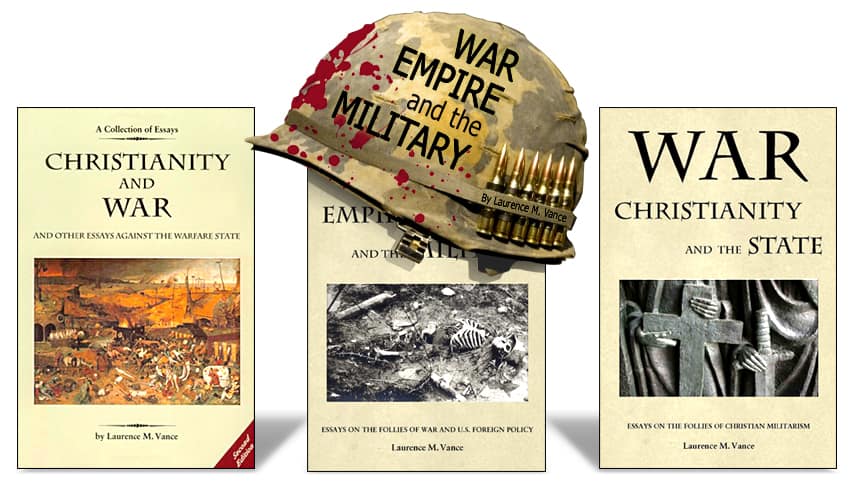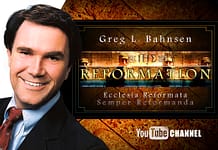
War and Christian Militarism
Book Review Written by John Larabell
Are you a “Christian warmonger,” a “Red-state Fascist,” a “Reich-Wing nationalist,” an “Imperial Christian,” a “Christian killer,” a “pro-life murderer,” a “double-minded warmonger,” a “God-and-country Christian bumpkin,” or a “warvangelical Christian”? According to Laurence M. Vance, Ph.D., you may be if you support current U.S. foreign policy and the current actions of the U.S. military. Do you get your news from the “Fox War Channel” and the “War Street Journal”? If so, you need to read Vance’s books War, Christianity, and the State: Essays on the Follies of Christian Militarism and War, Empire, and the Military: Essays on the Follies of War and U.S. Foreign Policy.
War, Christianity, and the State is a collection of 76 of Vance’s essays written between 2003 and 2013, all of which appeared on LewRockwell.com. Vance accurately summarizes the contents of the chapters:
In chapter 1, “Christianity and War,” Christian enthusiasm for war and the military is shown to be an affront to the Saviour, contrary to Scripture, and a demonstration of the profound ignorance many Christians have of history. In chapter 2, “Christianity and the Military,” the idea that Christians should have anything to do with the military is asserted to be illogical, immoral, and unscriptural. In chapter 3, “Christianity and the Warfare State,” I argue that Christians who condone the warfare state, its senseless wars, its war on a tactic (terrorism), its nebulous crusades against “evil,” its aggressive militarism, its interventions into the affairs of other countries, and its expanding empire have been duped. In chapter 4, “Christianity and Torture,” I contend that it is reprehensible for Christians to support torture for any reason.
Vance writes as a conservative, evangelical, fundamentalist Christian, holding degrees in history, theology, accounting, and economics. His main message in War, Christianity, and the State is that
If there is any group of people that should be opposed to war, torture, militarism, and the warfare state with its suppression of civil liberties, imperial presidency, government propaganda, and interventionist foreign policy it is Christians, and especially conservative, evangelical, and fundamentalist Christians who claim to strictly follow the dictates of Scripture and worship the Prince of Peace.
Vance sharply rebukes supporters of the warfare state, particularly Christians, and illustrates the follies and horrors of war. He points out the hypocrisy of Christians who support U.S. militarism, the warfare state, the neoconservative-dominated Republican Party, and those who believe almost everything coming from Fox News, Rush Limbaugh, Sean Hannity, Bill O’Reilly, and Glenn Beck. Many such Christians claim to worship the Prince of Peace yet wholeheartedly endorse acts of violence against other people in the form of war. He dubs such Christians “Christian killers” to illustrate this contradiction.
While some Christians may in fact be opposed to the numerous wars of aggression entered into by the United States, they almost to a person still “support the troops,” because the troops are “just following orders” and are thus justified in their killing of those who have not actually attacked the U.S. homeland. While Vance admits that killing in genuine defense of one’s life or family is justified, he also argues that killing other human beings, Christian or not, merely because the government labels them as “the enemy” is not justifiable and is therefore murder. In light of this, Vance believes that Christians should not serve in today’s military, and if they are already in the military, they should refuse to kill people in wars of aggression, no matter the consequences. Vance elaborates:
Most people say the troops are not responsible because they’re just following orders…. Many evangelical Christians agree, and join in this chorus of statolatry with their “obey the powers that be” mantra….
First of all, the last time I looked in my Bible, I got the strong impression that it was only God who should be obeyed 100 percent of the time without question…. If the U.S. government told someone to kill his mother, any American would be outraged if he under any circumstances went and did it. But if the government tells someone to put on a uniform and go kill some Iraqi’s mother, the typical American puts a yellow ribbon on his car and says we should support the troops…. Being told to clean or paint a piece of equipment is one thing; being told to bomb or shoot a person is another.
War, Empire, and the Military is a collection of 127 of Vance’s essays written between 2004 and 2014, with the bulk of them appearing on LewRockwell.com. Vance notes of the seven chapters:
In chapter 1, “War and Peace,” the evils of war and warmongers and the benefits of peace are examined. In chapter 2, “The Military,” the evils of standing armies and militarism are discussed, including a critical look at U.S. military. In chapter 3, “The War in Iraq,” the wickedness of the Iraq War is exposed. In chapter 4, “World War II,” the “good war” is shown to be not so good after all. In chapter 5, “Other Wars,” the evils of war and the warfare state are chronicled in specific wars: the Crimean War (1854-1856), the Russo-Japanese War (1904-1905), World War I (1914-1918), the Persian Gulf War (1990-1991), and the war in Afghanistan (2001-). In chapter 6, “The U.S. Global Empire,” the beginnings, growth, extent, nature, and consequences of the U.S. empire of bases and troops are revealed and critiqued. In chapter 7, “U.S. Foreign Policy,” the belligerence, recklessness, and follies of U.S. foreign policy are laid bare.
According to Vance, the underlying theme in this collection of essays is
opposition to the warfare state that robs us of our liberty, our money, and in some cases our life. Conservatives who decry the welfare state while supporting the warfare state are terribly inconsistent. The two are inseparable. Libertarians who are opposed to war on principle, but support the state’s bogus “war on terrorism,” even as they remain silent about the U.S. global empire, are likewise contradictory.
War, Empire, and the Military is a great study of history and a must-read for anyone who supports current U.S. foreign policy. Vance begins the book by explaining the views of classical Western thinkers and the views of the Founding Fathers regarding war, empire, and the military, telling how (and why) the early Americans were very much opposed to the modern warfare state with its foreign entanglements, foreign wars, and massive military budget. After all, the U.S. military, Vance says throughout both books, is now used for everything but its original purpose: the defense of the United States and the securing of her national borders.
In addition to giving detailed accounts of why many of the wars of the past two centuries were actually fought (often not the reasons given in American public-school history classes), Vance includes a number of essays depicting the horrors of war from the perspective of soldiers on the battlefield. After reading many of these accounts, only the most calloused individuals would still be eager to see America involved in another war.
War, Christianity, and the State is no doubt the more controversial of the two books. Many conservative Christians will vehemently disagree with Vance’s views on the current evils of the U.S. military and war in general. In fact, Vance mentions the criticism he receives from many Christians (most of whom are not in the military) for his opposition to U.S. foreign policy and the warfare state. He admits that he has been called “liberal,” “communist,” “anti-war weenie,” “traitor,” “coward,” “America-hater,” and other vulgarities that will not be printed here. But Vance argues his points well, and provides a great deal of historical background on Christian opposition to war and the views of the Founding Fathers on war and standing armies to make his case. Additionally, Vance includes a number of essays featuring letters he has received from military personnel who agree with him. An open-minded reader who is a genuine Christian would find it difficult to disagree with Vance’s primary theses in both books.
A few small criticisms are in order. There is a great deal of overlap among the various essays, which is to be expected, and which Vance admits to in the beginning of both books. Additionally, there are a number of minor spelling and grammar errors, and, as the essays were primarily online postings, there are many spots that were obvious hyperlinks that do not show up in the books, which can be a bit awkward for the reader. This, also, Vance admits to.
But as mentioned above, both books — War, Christianity, and the State and War, Empire, and the Military — are must-reads for conservative Christians, many of whom have supported the military and the American warfare state. Although Vance has a literary wit and offers sharp criticism of those he disagrees with in order to provoke a thoughtful response, open-minded readers will no doubt come to agree with many of his views.










